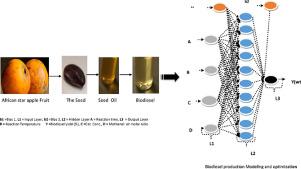Journal of the Taiwan Institute of Chemical Engineers ( IF 5.5 ) Pub Date : 2021-06-20 , DOI: 10.1016/j.jtice.2021.06.012 Dominic Okechukwu Onukwuli , Chizoo Esonye , Akuzuo Uwaoma Ofoefule , Rita Eyisi

|
Efficient and sustainable commercial production of biodiesel requires process optimization and modeling using artificial intelligence techniques. Artificial neural network-genetic algorithm (ANN-GA) and response surface methodology (RSM) were used to predict the optimal process conditions for biodiesel synthesis from novel chrysophyllium albidum seed oil. Application of Levenberg -Marquardt algorithm and full factorial central composite design-desirability function analysis were carried out for ANN and RSM respectively. The biodiesel obtained at the optimum conditions was characterized using gas chromatography-mass spectrophotometer (GC–MS), Fourier transform infrared (FTIR), AOAC and ASTM D standard methods. The ANN and RSM correlation coefficients were 0.98 and 0.95 respectively. The best RSM fitted model was second order polynomial while the ANN best architecture topology consists of three layers: input layer with four input variables, hidden layer with ten hidden neurons and an output layer with single output variable. Optimization of the process shows that: RSM optimum conditions for biodiesel yield of 85.91wt% validated at 86.85wt% were 65.62°C, 2.14wt% catalyst concentration, 62.04 min and 5.88 methanol: oil molar ratio with overall desirability of 1.00. ANN-GA gave 9.40% faster reaction time and required 15.88% less energy, 3.76% more alcohol and 16.82% less catalyst with 1.86wt% more biodiesel yield than RSM optimized conditions. Ascertained fuel properties, GC–MS and FTIR characterizations confirmed unsaturation and good cold-flow qualities of the biodiesel. Overall results presented ANN-GA as better than RSM and a reliable modeling and optimization technique for viable and sustainable production of biodiesel from chrysophyllum albidum seed.
中文翻译:

人工神经网络-遗传算法与响应面法-期望函数在预测黄芪籽油合成生物柴油最佳条件中的应用对比分析
生物柴油的高效和可持续商业生产需要使用人工智能技术进行工艺优化和建模。人工神经网络遗传算法 (ANN-GA) 和响应面法 (RSM) 用于预测从新型白花菜中合成生物柴油的最佳工艺条件籽油。分别对ANN和RSM进行了Levenberg-Marquardt算法的应用和全因子中心复合设计-合意函数分析。使用气相色谱-质谱仪 (GC-MS)、傅里叶变换红外 (FTIR)、AOAC 和 ASTM D 标准方法对在最佳条件下获得的生物柴油进行表征。ANN 和 RSM 的相关系数分别为 0.98 和 0.95。最佳 RSM 拟合模型是二阶多项式,而 ANN 最佳架构拓扑由三层组成:具有四个输入变量的输入层、具有十个隐藏神经元的隐藏层和具有单个输出变量的输出层。工艺优化表明:RSM最佳条件为生物柴油收率为85.91wt%,验证为86.85wt%为65.62°C,2.14wt% 催化剂浓度,62.04 分钟和 5.88 甲醇:油摩尔比,总体期望值为 1.00。与 RSM 优化条件相比,ANN-GA 的反应时间缩短了 9.40%,所需能量减少了 15.88%,酒精减少了 3.76%,催化剂减少了 16.82%,生物柴油产量增加了 1.86%。确定的燃料特性、GC-MS 和 FTIR 表征证实了生物柴油的不饱和度和良好的冷流质量。总体结果表明,ANN-GA 优于 RSM,并且是一种可靠的建模和优化技术,可用于从chrysophyllum albidum种子中可行和可持续地生产生物柴油。









































 京公网安备 11010802027423号
京公网安备 11010802027423号